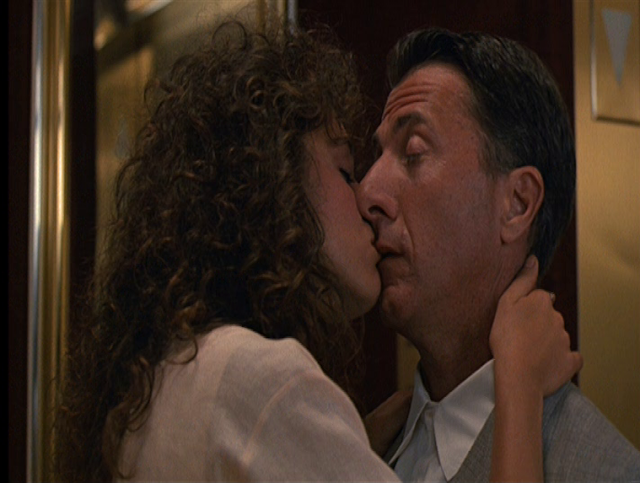In this 1988 sci-fi classic, Tom Cruise becomes the first neurotypical to gradually learn not to actively torture the autistic people in your life with loud noises and disruptive bullshit.
 |
| Using a physical line of demarcation to show that they live in different worlds is level 1. Level 2 is that Cruise's world is empty, while Rain Man's is populated by ceaselessly turning wheels. |
Justin Hoffman plays the titular savant rudely interrupted from his routine of TV slop and tapioca pudding by Cruise's embittered normal who, at first, connives to wring half the inheritance his estranged father bequeathed to Rain Man out of Rain Man's stuffed-shirt custodian. Cruise is one of those movie assholes we like much more than we might a boring nice guy, and it's only because we start to root as hard for Rain Man that we can forgive his softening ad tedium over the movie's course. Naturally perturbed by the disruption of his routines, Rain Man has a tough time on the road with Cruise, but gets his Chad on when it turns out he can rinse a Vegas casino by counting cards.
 |
| I hope they fired whoever didn't score this scene with "Sharp Dressed Man" by ZZ Top. |
Rain Man even sort-of gets molested by Cruise's gf in an elevator in a scene reminiscent of Greatest Movie of All Time Pumpkin.
 |
| Sorry Tom Cruise, in the real world the barely functioning autist gets (molested by) the girl. |
If you take the film's events too literally, it still works, but on a bad-taste comedy basis. But movies aren't about literal events but the stuff of feelings. Rain Man isn't an ethics course on how to treat irl min-maxers, but a feel-good road trip through a world that no longer exists and never did, and anyway, what does anyone alive today know about treating my people with decency and respect? You devise ever more labyrinthine systems of offence and taboo to trip us up when we can barely navigate the standards that existed yesterday - a fun game for normoid social climbers, a Kafkaesque gauntlet for us. You throw riots and revolutions because you're bored (because you're boring) when all we want is stability in which to do all the real thinking that gets done. The internet, our home, you occupy and police. Finally you redefine us as "neurodiverse", another stripe on your endlessly metastasizing rainbow vomit flag; a function of your ideology, not a people unto ourselves.
 |
| #ActuallyAutistic posters if they had that tell-the-truth curse from Liar Liar. |
So while it only lasted for one Oscarbait season in 1988, Rain Man remains the triumphant high water mark for tism on film and in the culture. Definitely...definitely watch Rain Man.















